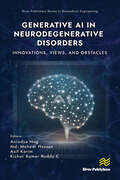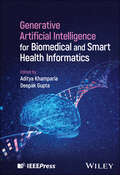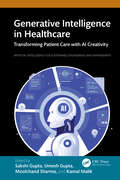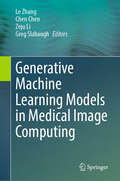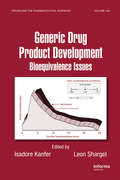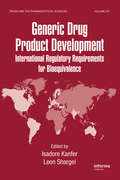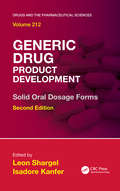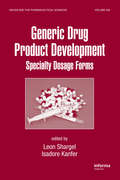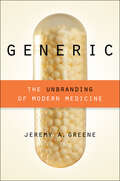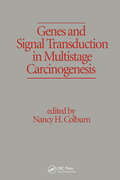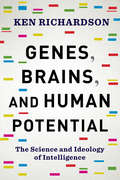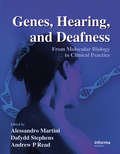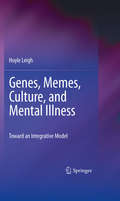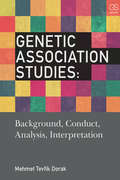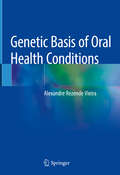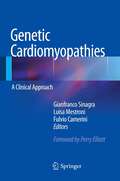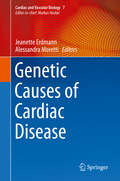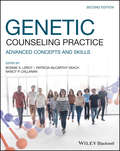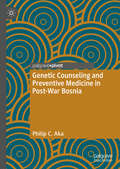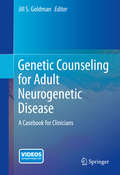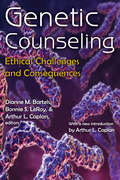- Table View
- List View
Generative AI in Neurodegenerative Disorders: Innovations, Views, and Obstacles (River Publishers Series in Biomedical Engineering)
by Anindya Nag Md. Mehedi Hassan Asif Karim Reddy C Kishor KumarThis book delves into the transformative power of AI in the realm of neurodegenerative diseases,covering topics such as ALS, Huntington’s, Parkinson’s, and Alzheimer’s. Generative AIprovides new opportunities for early diagnosis, precise therapy, and individualized rehabilitation,which are crucial as these conditions remain major obstacles for healthcare providersand researchers.Researchers, physicians, AI developers, and healthcare professionals will find this bookan invaluable resource for understanding how AI is influencing the development of treatmentsfor neurodegenerative diseases. It describes important obstacles and future directions whileproviding insights into the newest breakthroughs, thus bridging the gap between technologyand practical clinical applications. Anyone involved in neurodegenerative healthcare, fromscientists conducting AI-driven medical research to physicians seeking to incorporate AI intopatient care or AI professionals investigating new healthcare applications, will find the informationand insights they need in this comprehensive book.Predictive analytics, biomarker identification, and drug discovery are being transformedby AI-driven models, such as deep neural networks, generative adversarial networks (GANs),and variational autoencoders (VAEs). This book offers a comprehensive examination of thesedevelopments. Robots, wearable sensors, and cognitive therapy platforms are some of theAI-enhanced rehabilitation tools covered, as are AI-integrated cutting-edge technologies likefMRI and MRI, gene-editing methods like CRISPR, and more.In addition to discussing recent technical developments, this book takes a close look atthe data privacy, ethics, and regulatory issues that arise when using AI to study neurodegenerativedisorders. Issues like algorithmic bias, model explainability, and fair AI-driven healthcareare thoroughly investigated in light of the growing usage of AI models in clinical decision-making,mental health applications, and cognitive rehabilitation.
Generative Artificial Intelligence for Biomedical and Smart Health Informatics
by Deepak Gupta Aditya KhampariaEnables readers to understand the future of medical applications with generative AI and related applications Generative Artificial Intelligence for Biomedical and Smart Health Informatics delivers a comprehensive overview of the most recent generative AI-driven medical applications based on deep learning and machine learning in which biomedical data is gathered, processed, and analyzed using data augmentation techniques. This book covers many applications of generative models for medical image data, including volumetric medical image segmentation, data augmentation, MRI reconstruction, and modeling of spatiotemporal medical data. The book explores findings obtained by explainable AI techniques, with coverage of various techniques rarely reported in literature. Throughout, feedback and user experiences from physicians and medical staff, as well as use cases, are included to provide important context. The book discusses topics including privacy and security challenges in AI-enabled health informatics, biosensor-guided AI interventions in personalized medicine, regulatory frameworks and guidelines for AI-based medical devices, education and training for building responsible AI solutions in healthcare, and challenges and opportunities in integrating generative AI with wearable devices. Topics covered include: Treatment of neurological disorders using intelligent techniques and image-guided and tomography interventions for neuromuscular disordersBio-inspired smart healthcare service frameworks with AI, machine learning, and deep learning, integration of IoT devices, and edge computing in industrial and clinical systemsTraffic management and optimization in distributed environments, patient data management, disease surveillance and prediction, and telemedicine and remote monitoringEducation-driven, peer-to-peer, and service-oriented architectures and transparency and accountability in medical decision-making Generative Artificial Intelligence for Biomedical and Smart Health Informatics is an essential reference for computer science researchers, medical professionals, healthcare informatics, and medical imaging researchers interested in understanding the potential of artificial intelligence and other related technologies in healthcare.
Generative Intelligence in Healthcare: Transforming Patient Care with AI Creativity (Artificial Intelligence for Sustainable Engineering and Management)
by Umesh Gupta Moolchand Sharma Sakshi Gupta Kamal MalikThis book explores the intersection of artificial intelligence and healthcare with a focus on generative intelligence. The book will introduce the concept of generative intelligence and its transformative potential in patient care, showcasing applications that go beyond conventional AI approaches.Generative Intelligence in Healthcare: Transforming Patient Care with AI Creativity delves into the use of generative models for personalized medicine, data analytics, and predictive modelling, providing real-world examples of how AI creativity can revolutionize treatment strategies and diagnostic processes. It focuses on the origin and basics of generative AI, generative AI models, and possible areas in healthcare where generative AI can work. It discusses how generative AI model will help healthcare providers automatically generate prescriptions, discharge summaries, and patient conditions. The unique strength of this book lies in its comprehensive examination of ethical considerations and regulatory frameworks, ensuring a responsible and transparent integration of generative intelligence in healthcare. By addressing current challenges and envisioning future directions, this book serves as a valuable resource for healthcare professionals, researchers, and policymakers seeking to harness the full potential of AI creativity to enhance patient outcomes.The book is written for graduate students, researchers, and professionals in biomedical engineering, electrical engineering, signal process engineering, biomedical imaging, and computer science.
Generative Machine Learning Models in Medical Image Computing
by Chen Chen Le Zhang Zeju Li Greg SlabaughGenerative Machine Learning Models in Medical Image Computing" provides a comprehensive exploration of generative modeling techniques tailored to the unique demands of medical imaging. This book presents an in-depth overview of cutting-edge generative models such as GANs, VAEs, and diffusion models, examining how they enable groundbreaking applications in medical image synthesis, reconstruction, and enhancement. Covering diverse imaging modalities like MRI, CT, and ultrasound, it illustrates how these models facilitate improvements in image quality, support data augmentation for scarce datasets, and create new avenues for predictive diagnostics. Beyond technical details, the book addresses critical challenges in deploying generative models for healthcare, including ethical concerns, interpretability, and clinical validation. With a strong focus on real-world applications, it includes case studies and implementation guidelines, guiding readers in translating theory into practice. By addressing model robustness, reproducibility, and clinical utility, this book is an essential resource for researchers, clinicians, and data scientists seeking to leverage generative models to enhance biomedical imaging and deliver impactful healthcare solutions. Combining technical rigor with practical insights, it offers a roadmap for integrating advanced generative approaches in the field of medical image computing.
Generic Challenge: Understanding Patents, FDA and Pharmaceutical Life-Cycle Management (Fifth Edition)
by Martin a. VoetThis Fifth Edition of The Generic Challenge provides important new updates on current regulatory, legal and commercial issues affecting brand and generic pharmaceutical products, including new laws establishing generics for biologics, and changes brought about by the recently enacted America Invents Act. It explains clearly and understandably the roles of patents, FDA regulation of drugs and the Hatch Waxman Act in commercial drug development in light of generic challenges and how improvements in innovative drug products provide benefits to patients while extending the commercial lives of the drugs. There is simply no other book of its kind on this important subject.
Generic Drug Product Development: Bioequivalence Issues
by Isadore Kanfer Leon ShargelThe assessment of bioequivalence is an important process whereby the bioavailability of a generic drug product is compared with its brand-name counterpart. Generic pharmaceutical products must be approved as therapeutic equivalents to the brand name alternative in order to be interchangeable. The demonstration of bioequivalence is an important comp
Generic Drug Product Development: International Regulatory Requirements for Bioequivalence
by Isadore Kanfer Leon ShargelDue to a worldwide need for lower cost drug therapy, use of generic and multi-source drug products have been increasing. To meet international patent and trade agreements, the development and sale of these products must conform to national and international laws, and generic products must prove that they are of the same quality and are therapeutica
Generic Drug Product Development: Solid Oral Dosage Forms, Second Edition (Drugs and the Pharmaceutical Sciences)
by Isadore Kanfer Leon ShargelIn this era of increased pharmaceutical industry competition, success for generic drug companies is dependent on their ability to manufacture therapeutic-equivalent drug products in an economical and timely manner, while also being cognizant of patent infringement and other legal and regulatory concerns.Generic Drug Product Development: Solid Oral
Generic Drug Product Development: Specialty Dosage Forms
by Isadore Kanfer Leon ShargelGeneric Drug Product Development: Specialty Dosage Forms explores the issues related to providing evidence of pharmaceutical equivalence and bioequivalence for specialty drug products. It describes various scientific approaches and regulatory requirements for manufacturers who need to demonstrate the therapeutic equivalence of generic specialty dru
Generic: The Unbranding of Modern Medicine
by Jeremy A. GreeneThe turbulent history of generic pharmaceuticals raises powerful questions about similarity and difference in modern medicine.Generic drugs are now familiar objects in clinics, drugstores, and households around the world. We like to think of these tablets, capsules, patches, and ointments as interchangeable with their brand-name counterparts: why pay more for the same? And yet they are not quite the same. They differ in price, in place of origin, in color, shape, and size, in the dyes, binders, fillers, and coatings used, and in a host of other ways. Claims of generic equivalence, as physician-historian Jeremy Greene reveals in this gripping narrative, are never based on being identical to the original drug in all respects, but in being the same in all ways that matter.How do we know what parts of a pill really matter? Decisions about which differences are significant and which are trivial in the world of therapeutics are not resolved by simple chemical or biological assays alone. As Greene reveals in this fascinating account, questions of therapeutic similarity and difference are also always questions of pharmacology and physiology, of economics and politics, of morality and belief.Generic is the first book to chronicle the social, political, and cultural history of generic drugs in America. It narrates the evolution of the generic drug industry from a set of mid-twentieth-century "schlock houses" and "counterfeiters" into an agile and surprisingly powerful set of multinational corporations in the early twenty-first century.The substitution of bioequivalent generic drugs for more expensive brand-name products is a rare success story in a field of failed attempts to deliver equivalent value in health care for a lower price. Greene’s history sheds light on the controversies shadowing the success of generics: problems with the generalizability of medical knowledge, the fragile role of science in public policy, and the increasing role of industry, marketing, and consumer logics in late-twentieth-century and early twenty-first century health care.
Generics and Bioequivalence (Routledge Revivals)
by Andre J. JacksonPublished in 1994: This text focuses on the determination of bioequivalence between formulations that are pharmaceutically equivalent and manufactured using acceptable chemistry, manufacturing and controls and in accordance with Good Manufacturing Practices.
Genes and Cardiovascular Function
by Bohuslav Ostadal Makoto Nagano Naranjan S. DhallaRapid advances in molecular medicine have led to pronounced new developments in experimental and clinical cardiology. In the embrace of modern molecular biology and bridging the gap between the clinical and the genomic, cardiovascular medicine has seen major strides in the understanding of the molecular mechanisms that drive disease progression. The ability to rapidly identify candidate human genes for cardiovascular diseases lends itself to the development of diverse strategies for disease treatment and management. The wide variety of gene expressions proffers excellent targets for novel therapeutics. Gene therapy is steadily increasing in viability and represents a fascinating arena of research and clinical focus. This book is based on two international Mendel symposia on "Genes and the Heart," joint meetings of the Japanese and European sections of the International Academy of Cardiovascular Sciences. Highlighting selected symposia contributions, this book explores the role of molecular biology and genetics in the basic knowledge, genesis, and clinical interventions of cardiovascular diseases.
Genes and Signal Transduction in Multistage Carcinogenesis
by Nancy H. ColburnThis book describes the identification and characterization of genetic loci that determine susceptibility to liver, mammary, or skin carcinogenesis in rodents. It focuses on protein kinases and phospholipases, and stress-related signal transduction.
Genes, Brains, and Human Potential: The Science and Ideology of Intelligence
by Ken RichardsonFor countless generations people have been told that their potential as humans is limited and fundamentally unequal. The social order, they have been assured, is arranged by powers beyond their control. More recently the appeal has been to biology, specifically the genes, brain sciences, the concept of intelligence, and powerful new technologies. Reinforced through the authority of science and a growing belief in bio-determinism, the ordering of the many for the benefit of a few has become more entrenched. Yet scientists are now waking up to the influence of ideology on research and its interpretation. In Genes, Brains, and Human Potential, Ken Richardson illustrates how the ideology of human intelligence has infiltrated genetics, brain sciences, and psychology, flourishing in the vagueness of basic concepts, a shallow nature-versus-nurture debate, and the overhyped claims of reductionists. He shows how ideology, more than pure science, has come to dominate our institutions, especially education, encouraging fatalism about the development of human intelligence among individuals and societies. Genes, Brains, and Human Potential goes much further: building on work being done in molecular biology, epigenetics, dynamical systems, evolution theory, and complexity theory, it maps a fresh understanding of intelligence and the development of human potential. Concluding with an upbeat message for human possibilities, this synthesis of diverse perspectives will engender new conversations among students, researchers, and other interested readers.
Genes, Hearing, and Deafness: From Molecular Biology to Clinical Practice
by Dafydd Stephens Alessandro Martini Andrew P ReadThe field of generic hearing impairment is one where rapid advances are taking place, and it can often be difficult for Audiologists to keep track of the broader picture. In this important new text the authors take a synoptic approach and summarize the causes and basis of hearing impairments, the impact on the individual and the therapies available
Genes, Memes, Culture, and Mental Illness
by Hoyle LeighWhat produces mental illness: genes, environment, both,neither? The answer can be found in memes--replicable units of information linking genes and environment in the memory and in culture--whose effects on individual brain development can be benign or toxic. This book reconceptualizes mental disorders as products of stressful gene-meme interactions and introduces a biopsychosocial template for meme-based diagnosis and treatment. A range of therapeutic modalities, both broad-spectrum (meditation) and specific(cognitive-behavioral), for countering negative memes and their replication are considered, as are possibilities for memetic prevention strategies. In this book, the author outlines the roles of genes and memes in the evolution of the human brain; elucidates the creation, storage, and evolution of memes within individual brains; examines culture as a carrier and supplier of memes to the individual; provides examples of gene-meme interactions that can result in anxiety, depression, and other disorders; proposes a multiaxial gene-meme model for diagnosing mental illness; identifies areas of meme-based prevention for at-risk children; and defines specific syndromes in terms of memetic symptoms, genetic/ memetic development, and meme-based treatment.
Genesis
by Robin CookNew York Times-bestselling author Robin Cook takes on the ripped-from-the-headlines topic of harnessing DNA from ancestry websites to catch a killer in this timely and explosive new medical thriller.When the body of twenty-eight-year-old social worker Kera Jacobsen shows up on Chief New York City Medical Examiner Laurie Montgomery's autopsy table, at first it appears she was the victim of a tragic yet routine drug overdose. But for Laurie and her new pathology resident, the brilliant but enigmatic Dr. Aria Nichols, little things aren't adding up. Kera's family and friends swear she never touched drugs. Administrators from the hospital where Kera worked are insisting the case be shrouded in silence. And although Kera was ten weeks pregnant, nobody seems to know who the father was--or whether he holds the key to Kera's final moments alive.As a medical emergency temporarily sidelines Laurie, impulsive Aria turns to a controversial new technique: using genealogic DNA databases to track down those who don't want to be found. Working with experts at a start-up ancestry website, she plans to trace the fetus's DNA back to likely male relatives in the hopes of identifying the mystery father. But when Kera's closest friend and fellow social worker is murdered, the need for answers becomes even more urgent. Because someone out there clearly doesn't want Kera's secrets to come to light . . . and if Aria gets any closer to the truth, she and Laurie might find themselves a killer's next targets.
Genetic Association Studies: Background, Conduct, Analysis, Interpretation
by Mehmet Tevfik DorakGenetic Association Studies is designed for students of public health, epidemiology, and the health sciecnes, covering the main principles of molecular genetics, population genetics, medical genetics, epidemiology and statistics. It presents a balanced view of genetic associations with coverage of candidate gene studies as well as genome-wide association studies. All aspects of a genetic association study are included, from the lab to analysis and interpretation of results, but also bioinformatics approaches to causality assessment. The role of the environment in genetic disease is also highlighted. Genetic Association Studies will enable readers to understand and critique genetic association studies and set them on the way to designing, executing, analyzing, interpreting, and reporting their own.
Genetic Basis of Oral Health Conditions
by Alexandre Rezende VieiraThis book explains the genetic basis of a wide range of dental disorders, including dental caries, periodontitis, congenital anomalies, malocclusions, orofacial pain, dental implant failure, and cancer. Such conditions are typically multifactorial or complex, with involvement of more than one gene as well as environmental influences. A sound grasp of this framework is ever more important, given the emergence of consumer genomics, including direct-to-consumer genetic testing. Dental professionals now need to understand why one person is susceptible to a particular oral health condition while a first-degree relative either does not develop the condition or does so in a less severe form. Knowledge of how genes operate in the susceptible host is essential if patients are to be offered accurate advice about their risks. The information provided in this book will assist in the delivery of effective personalized dental care through optimization of preventive strategies. It will enable the practitioner to explain the extent to which a patient’s condition is pure "bad luck", whether that bad luck can be changed by behavioral choices, and how many of our behaviors are influenced by genes.
Genetic Cardiomyopathies
by Fulvio Camerini Gianfranco Sinagra Luisa MestroniIn the last decade, genetics has been emerging as a primary issue in the diagnosis and management of cardiomyopathies. This book is intended to be a state-of-the-art monograph on these diseases, describing their genetic causes, defining the molecular basis and presenting extensive descriptions of genotype-phenotype correlations. Other chapters are focused on the role of clinical observation, on ECG and echocardiography. With its highlight on the most recent discoveries in the field of molecular genetics as well as on the correct clinical approach to patients with heart muscle disease, the book is aimed at physicians and clinical cardiologists with a particular interest in myocardial diseases and in their genetic causes.
Genetic Causes of Cardiac Disease (Cardiac and Vascular Biology #7)
by Jeanette Erdmann Alessandra MorettiThis book provides a comprehensive summary of the latest developments in the field of the genomics of cardiac disease. Written and edited by leading clinicians and scientists involved in the analysis and therapy of genetic cardiac disorders, it discusses the genetic causes of a variety of cardiac diseases, such as the complex genetics and etiology of congenital heart diseases. It also explores sex differences in prevalent diseases, genetics-based therapeutic strategies and the use of various animal models and alternatives. The book is intended for research scientists and clinical scientists in the cardiovascular field, human geneticists and cardiologists.
Genetic Counseling Practice: Advanced Concepts and Skills (Genetic Counseling In Practice Ser.)
by Patricia McCarthy Veach Bonnie S. LeRoy Nancy P. CallananThe second edition of Genetic Counseling Practice: Advanced Concepts and Skills, provides in-depth content regarding the advanced competencies for meeting patient needs across the changing landscape of genetic counseling practice. The content aligns with the Reciprocal Engagement Model (REM) of practice which integrates the biomedical knowledge and psychosocial aspects of genetic counseling. This edition has been revised and expanded to reflect advances made in the present-day field. Edited by a team two genetic counselors and a psychologist, the chapters offer a holistic picture of genetic counseling. Chapter authors are all recognized experts in the profession. The chapters are grounded in evidence-based practice and research. Each chapter includes learning activities to help readers apply concepts and skills. Featured topic areas include: Meeting the needs of culturally diverse patients Addressing challenging patient dynamics Working with children, adolescents and families Using emerging service delivery models for genetic counseling Engaging in self-reflective, deliberate practice Promoting genetic counselor professional development Genetic Counseling Practice is an indispensable guide to the complex and evolving field of genetic counseling, and this updated second edition will help practitioners and trainees alike navigate its most pressing and practical challenges with skill and care.
Genetic Counseling and Preventive Medicine in Post-War Bosnia
by Philip C. AkaGenetic Counseling and Preventive Medicine in Post-War Bosnia offers a unique new perspective to longstanding debates on healthcare reforms in Bosnia. In this penetrating analysis, Philip C. Aka argues that twenty-five years after the ethnic war that shook Bosnia and Herzegovina to its foundations, healthcare reforms are a function of preventive medicine, defined as genetic counselling, backed by tobacco and alcohol control. At its core, the book offers a fresh examination of healthcare reforms in Bosnia set in the multidisciplinary field of bioethics, supplemented by comparative health studies, and comparative human rights. By offering an extensive list of electronically accessible literature on healthcare accessible in the public domain, Aka delivers an exemplar of research possibilities in the Information Age.
Genetic Counseling for Adult Neurogenetic Disease
by Jill S. GoldmanThe adult patient diagnosed with or at risk for a neurogenetic disease has many questions and concerns for the genetic counselor, the neurologist, and other practitioners. Because of the emotional and potentially life-altering impact of these diseases on the patient and family, counseling can be especially challenging. A rare hands-on guide to the subject, Genetic Counseling for Adult Neurogenetic Disease deals with core issues that differentiate adult neurogenetic counseling from its more familiar pediatric counterpart. This innovative book with accompanying videos is designed to fill in deficits in this area typical of training programs in genetic counseling (which have pediatrics and prenatal concentrations) and neurology (which rarely cover genetic counseling). For each condition featured, chapters include a detailed overview of genetic symptoms, diagnostic criteria, and management, plus guidelines for asking, and answering, pertinent questions. The major concentration, however, is on genetic counseling issues and case histories illustrating these issues. As an added dimension, the accompanying videos depict representative issues and challenges in genetic counseling for specific diseases in addition to the basics of a neurological examination. Among the conditions discussed: Movement disorders, including Parkinson's disease. Dementias, including Alzheimer's disease. Stroke. Motor neuron diseases. Neuropathies and channelopathies. Adult muscular dystrophies. Neurocutaneous syndromes. Plus a section on neurological and neuropsychological evaluation. This is information that will stay relevant as technologies change and genetic understanding evolves. Genetic Counseling for Adult Neurogenetic Disease offers advanced clinical wisdom for genetic counselors as well as neurologists, neuropsychologists, and other referring clinicians.
Genetic Counseling: Ethical Challenges and Consequences
by Dianne M. Bartels Arthur L. Caplan Bonnie S. LeRoyGenetic counseling is fairly new. The fact that the field is an accepted professional enterprise in universities, clinics, and hospitals throughout the United States is remarkable. The contributors argue that genetics and medicine rest on beliefs widely held in American society. Scientific progress is good, and highly sophisticated technologies are appropriate means to solving medical problems. The better understanding they gain about the nature and evolution of disease, the more prepared clinicians will be to treat and prevent future occurrence of disease. A belief that medicine, including genetic medicine, is clear, factually based, and objective undergirds the strategies and norms of genetic counseling. This collection of original papers explores the history, values, and norms of that process, with focus on the value of non-directiveness in counseling practice. The contributors' examination of genetic counseling issues serves as a foundation from which to address the ethical, legal, and policy considerations of clinical genetics.
